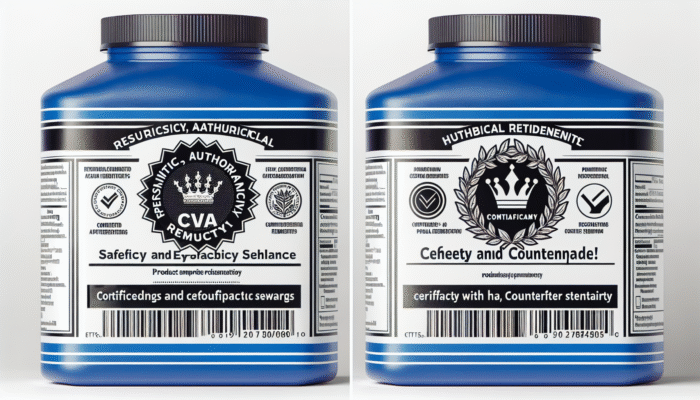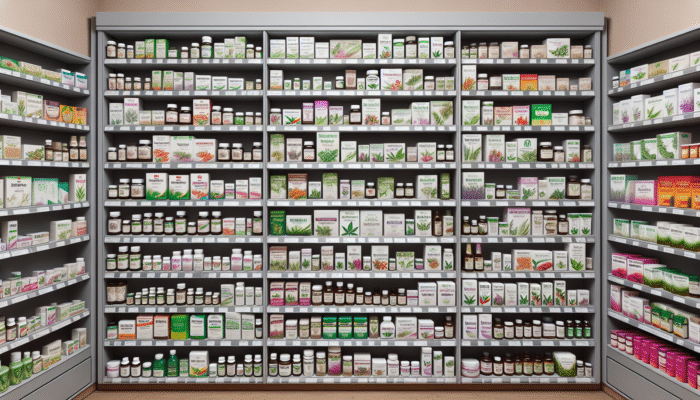Proven Strategies to Identify Authentic Herbal Products and Avoid Counterfeits
Thoroughly Inspect Product Labels to Confirm Authenticity

Identifying counterfeit herbal products starts with a thorough examination of the labels, which are vital in defending against fraudulent items. An authentic herbal product will clearly display compliance with UK regulations. Look for the Medicines and Healthcare products Regulatory Agency (MHRA) logo, which is a crucial sign that the product has undergone rigorous testing for safety and efficacy. Conversely, counterfeit items often lack this significant certification, as they aim to evade necessary regulatory scrutiny.
While scrutinising the ingredients list, watch for misspellings or unfamiliar components that could hint at fraudulent products. Authentic herbal offerings should feature well-defined ingredients that are easy to identify. If you come across any odd terms or poorly spelled words, it raises considerable concerns, suggesting the product may be fake or of inferior quality.
The integrity of the packaging is also a strong indicator of authenticity. Genuine herbal products tend to use high-quality materials and advanced printing techniques, reflecting their commitment to excellence. If you find faded prints, misaligned labels, or other signs of poor craftsmanship, it’s likely you’re dealing with a counterfeit product. Manufacturers take pride in their packaging, as it directly represents their brand’s credibility and dedication to quality.
Conduct Comprehensive Research on the Brand to Ensure Trustworthiness
Before committing to any herbal products, investing time in researching the official website of the brand in question is imperative. This step allows you to confirm the product’s existence while gathering extensive details about its benefits and recommended usage. An official UK website typically provides comprehensive information, including certifications and authentic customer reviews, helping you assess the product’s credibility and reliability effectively.
Customer reviews are an invaluable resource for evaluating a product’s authenticity. Seek consistent positive feedback on UK-based review platforms. Genuine customers often share specific insights regarding their experiences, allowing you to ascertain whether the product genuinely lives up to its claims. Be cautious of overly positive reviews that appear generic; they may indicate manipulated ratings designed to mislead consumers.
Furthermore, verify any brand accreditations from reputable UK organisations, such as the Soil Association for organic products. Recognition from these esteemed bodies not only enhances a brand’s credibility but also assures consumers that the products comply with strict quality and safety standards. This type of validation is essential for making informed purchasing decisions and guaranteeing product integrity.
Additionally, examining the brand’s engagement on social media platforms can provide valuable insights. A legitimate brand will actively interact with customers on platforms like Instagram, Facebook, and Twitter. Look for customer interactions, product announcements, and responses to inquiries; a vibrant and responsive online presence often indicates a trustworthy company committed to customer satisfaction and transparency.
Ultimately, evaluating third-party certifications is a crucial component of your research process. Certifications from respected UK organisations can confirm that the brand complies with industry standards and regulations. This not only strengthens the authenticity of the product but also enhances your confidence in your purchasing decisions, ensuring you make well-informed choices that prioritise your health.
Select Reliable Retailers for Your Herbal Purchases to Ensure Authenticity
The choice of where to purchase your herbal products is as significant as the products themselves. Opting for well-known UK pharmacies, such as Boots or LloydsPharmacy, guarantees a higher level of authenticity. These retailers have established reputations; every product they offer has undergone rigorous scrutiny, ensuring safety and efficacy. Shopping at these trusted outlets is a reliable way to avoid the risks associated with counterfeit goods.
When shopping online, remain vigilant about suspiciously low prices. If you come across herbal products offered at significantly reduced rates on lesser-known websites, exercise caution. Such discounts often serve as bait for unsuspecting consumers. Always choose established health stores, such as Holland & Barrett, renowned for their commitment to quality and exceptional customer service, ensuring you receive authentic products that meet your expectations.
Avoid purchasing from unverified sellers, particularly on platforms like eBay or the Amazon marketplace, where counterfeit products can easily circulate. Stick to reputable retailers with a proven track record of selling authentic products and robust return policies. This approach will not only safeguard your financial investment but also protect your health and well-being, ensuring you receive only the best products available.
Moreover, be cautious of promotional sales that appear too good to be true. While legitimate brands may occasionally offer discounts, if a deal seems excessively generous, it might be wise to question its authenticity. Trustworthy retailers maintain consistent pricing rather than offering steep discounts that seem irrational and unrealistic, a tactic often employed by counterfeit sellers trying to lure in unsuspecting customers.
Understand Pricing Trends to Identify Quality Herbal Products

Understanding the price range for herbal products is essential for spotting potential fakes. When comparing prices across various UK retailers, be cautious of unusually low prices. If one retailer offers a product at a significantly lower cost than others, it could signal that the item is counterfeit. Authentic products are priced according to their quality and the premium ingredients they contain; if the price seems too good to be true, it likely is, and you should proceed with caution.
Be particularly wary of offers that sound too good to be true. Many counterfeit products may be marketed at drastically reduced prices to entice consumers into making a purchase. A legitimate brand will not compromise on quality, and this is typically reflected in its pricing structure. If you’re considering a cheaper alternative, weigh the potential health risks against the savings you might gain, as authenticity should always be your top priority.
Recognising the costs associated with high-quality ingredients is crucial. Genuine herbal products typically contain premium botanical extracts that can be expensive to source and produce. By understanding this, you will appreciate that authentic products may carry a higher price tag. If a product is priced lower than expected, it could imply the use of inferior ingredients or even synthetic substitutes, which may pose significant health risks to consumers.
Additionally, be aware that market conditions can fluctuate. Seasonal availability or supply chain changes can affect prices, but any drastic variations should raise suspicion. Always compare similar products and check for consistency across various retailers to ensure you are making a well-informed and sound purchasing decision, safeguarding both your investment and health.
Perform a Detailed Examination of the Product to Confirm Authenticity
Once you have the product in hand, it is vital to conduct a detailed examination for any signs of authenticity. A genuine herbal product should align perfectly with its description on the label. If you notice inconsistencies, such as variations in colour, texture, or overall presentation, this may indicate that the product is counterfeit. Counterfeiters often cut corners, resulting in subpar products that do not meet authentic standards, putting consumers at risk.
Engaging in a smell and taste test can also provide significant insights into the product’s authenticity. Authentic herbal products typically possess a distinct and consistent aroma and flavour profile. If the product emits an unusual odour or lacks the expected intensity, it is worth questioning its authenticity. A true herbal supplement should engage the senses and deliver an experience that aligns with its advertised claims and quality standards.
Another critical aspect to investigate is the expiry date. Legitimate products will always have clearly printed expiry dates, while counterfeit items may either lack this information or present it in an inconsistent format. Be cautious of products that do not display a visible expiry date, as this is a common tactic employed by counterfeiters to mislead consumers and undermine safety.
Finally, inspecting the packaging details can reveal vital information about the product. Authentic products typically come in tamper-proof packaging that is well-designed and secure. Any signs of tampering, poor-quality materials, or inadequate sealing should raise your suspicion. A reputable brand invests in its packaging to ensure product integrity, so any deviations from this standard could indicate a counterfeit product that may not meet safety regulations.
Take Immediate Action to Report Suspected Counterfeit Herbal Products
If you suspect that you have encountered a counterfeit herbal product, taking immediate action can help protect both yourself and others in your community. Contacting Trading Standards should be your first step. They are responsible for investigating reports of counterfeit goods and can implement appropriate measures to ensure consumer safety. Reporting your concerns can initiate necessary investigations that help maintain market integrity and protect other consumers from harm.
Informing the Medicines and Healthcare products Regulatory Agency (MHRA) can also be crucial. The MHRA monitors counterfeit products and uses consumer reports to address these issues effectively. Your report could help identify trends or hotspots for counterfeit activity, thereby assisting in protecting other consumers from potential harm and ensuring safer market practices.
Utilising online reporting tools available on UK government websites is another effective method for reporting counterfeit products. These platforms often provide user-friendly forms that guide you through the complaint process. The more reports they receive, the better equipped they are to tackle the issue at a national level and uphold consumer safety standards, ensuring that the market remains free from fraudulent items.
Consulting with legal experts can provide clarity about your rights in such situations. Solicitors who specialise in counterfeit goods can offer you information on potential legal actions against sellers of fake products. Understanding your rights not only empowers you but can also deter others from engaging in deceptive practices that compromise consumer safety and well-being.
Lastly, alerting consumer advocacy groups like Which? can amplify your concerns. These organisations work diligently to protect consumers and raise awareness about counterfeit products. By bringing your case to their attention, you contribute to building a broader narrative that can influence change and promote transparency in the market, ultimately safeguarding consumers and fostering trust in legitimate products.
Common Questions Regarding Authentic Herbal Products Answered

What are the key signs that indicate counterfeit herbal products?
Common indicators of counterfeit products include poor packaging, misspelled ingredients, absence of regulatory approval, and pricing that seems unusually low. Always conduct a thorough examination of the label for authenticity markers to ensure your health and investment are safeguarded against fraud.
How should I report counterfeit herbal products effectively?
You can report suspected counterfeit products to Trading Standards, the MHRA, or relevant consumer advocacy groups to initiate investigations aimed at combating counterfeit goods and protecting consumers.
Why is MHRA approval essential for herbal products?
MHRA approval signifies that a product has undergone rigorous vetting for safety and efficacy, ensuring it meets strict UK health standards and regulations, which is vital for safeguarding consumer health and ensuring product reliability.
What steps should I take if I suspect I have purchased a counterfeit product?
Contact Trading Standards and the MHRA, and consult a solicitor if necessary. Reporting your concerns helps prevent counterfeit products from harming others and contributes to maintaining market integrity and safety.
How can I determine the trustworthiness of a brand?
Research the brand’s official website, check customer reviews on UK platforms, and look for accreditations from recognised organisations. This comprehensive approach will help you ensure the brand’s legitimacy and reliability, protecting your health and investment.
Are online deals on herbal products safe to pursue?
Exercise caution when dealing with online offers, especially if prices seem excessively low. Stick to reputable retailers known for their commitment to quality and authenticity to ensure your health is safeguarded against counterfeit products.
What factors should I consider when evaluating the pricing of herbal products?
Compare prices across multiple retailers, seek consistency in pricing, and be wary of offers that seem too good to be true, as they may indicate counterfeit products that could compromise your health and safety.
What should I do if the product has an unusual smell or taste?
If the product emits an unusual smell or lacks the expected taste, it may be counterfeit. Genuine herbal products should possess a distinct aroma and flavour that aligns with their claims, ensuring quality and safety for consumers.
How can I identify a quality herbal product effectively?
Look for clear ingredient listings, regulatory approvals, proper packaging, and purchases from reputable retailers to ensure that you are acquiring a quality herbal product that meets safety standards and customer expectations.
Is it safe to trust all health stores for herbal products?
Not all health stores are created equal. Always opt to purchase from established and well-reviewed retailers to ensure product authenticity and to protect your health and well-being from potential risks associated with counterfeit goods.
Connect with us on Facebook for more updates!
The Article: How to Spot Fake Herbal Products: A Guide appeared first on https://mcrtherapies.co.uk
The Article Spot Fake Herbal Products: Your Essential Guide Was Found On https://limitsofstrategy.com



